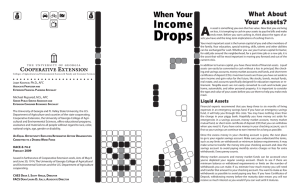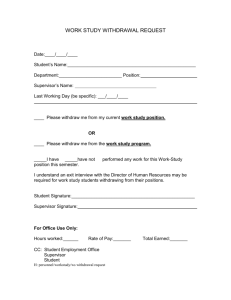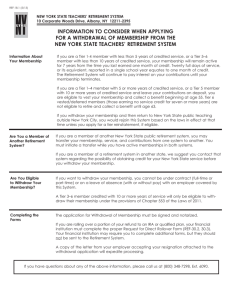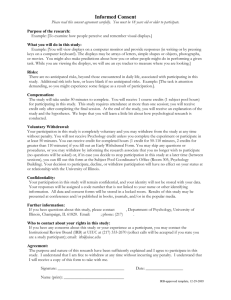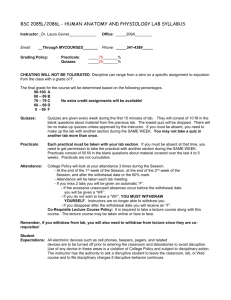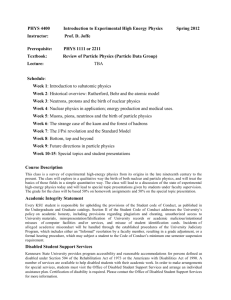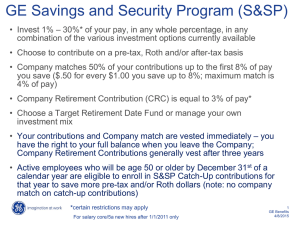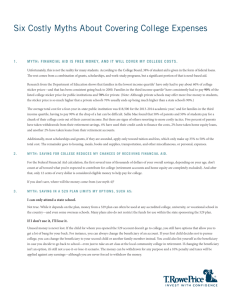What About Your Assets?
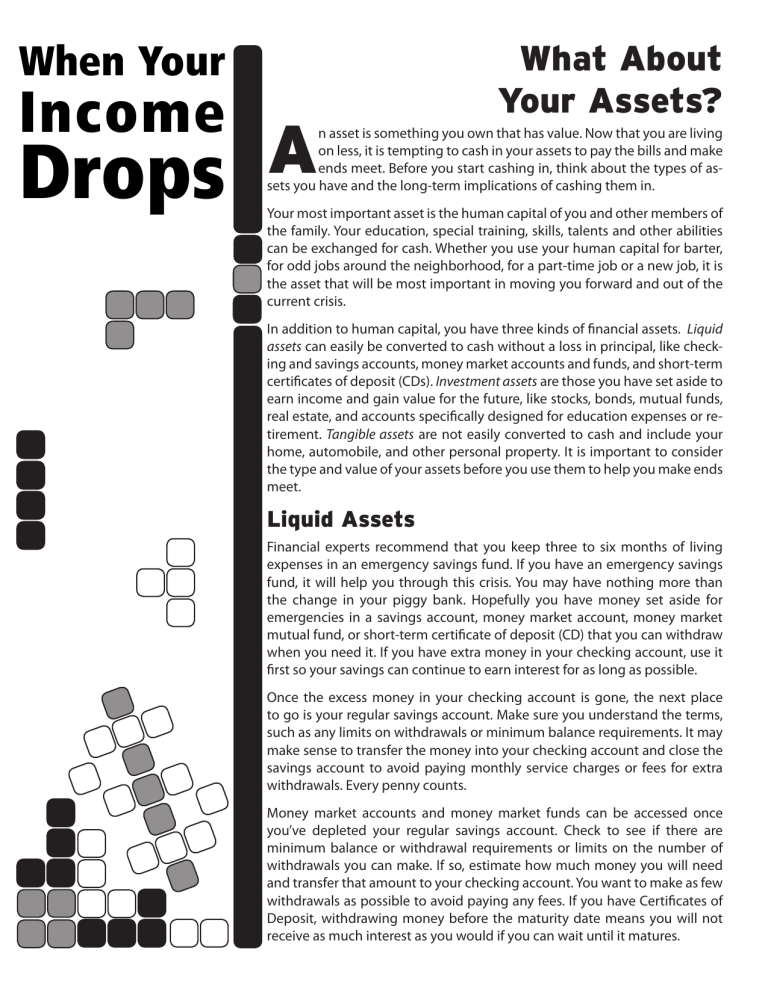
When Your
Income
Drops
What About
A
Your Assets?
n asset is something you own that has value. Now that you are living on less, it is tempting to cash in your assets to pay the bills and make ends meet. Before you start cashing in, think about the types of assets you have and the long-term implications of cashing them in.
Your most important asset is the human capital of you and other members of the family. Your education, special training, skills, talents and other abilities can be exchanged for cash. Whether you use your human capital for barter, for odd jobs around the neighborhood, for a part-time job or a new job, it is the asset that will be most important in moving you forward and out of the current crisis.
In addition to human capital, you have three kinds of financial assets. Liquid assets can easily be converted to cash without a loss in principal, like checking and savings accounts, money market accounts and funds, and short-term certificates of deposit (CDs). Investment assets are those you have set aside to earn income and gain value for the future, like stocks, bonds, mutual funds, real estate, and accounts specifically designed for education expenses or retirement. Tangible assets are not easily converted to cash and include your home, automobile, and other personal property. It is important to consider the type and value of your assets before you use them to help you make ends meet.
Liquid Assets
Financial experts recommend that you keep three to six months of living expenses in an emergency savings fund. If you have an emergency savings fund, it will help you through this crisis. You may have nothing more than the change in your piggy bank. Hopefully you have money set aside for emergencies in a savings account, money market account, money market mutual fund, or short-term certificate of deposit (CD) that you can withdraw when you need it. If you have extra money in your checking account, use it first so your savings can continue to earn interest for as long as possible.
Once the excess money in your checking account is gone, the next place to go is your regular savings account. Make sure you understand the terms, such as any limits on withdrawals or minimum balance requirements. It may make sense to transfer the money into your checking account and close the savings account to avoid paying monthly service charges or fees for extra withdrawals. Every penny counts.
Money market accounts and money market funds can be accessed once you’ve depleted your regular savings account. Check to see if there are minimum balance or withdrawal requirements or limits on the number of withdrawals you can make. If so, estimate how much money you will need and transfer that amount to your checking account. You want to make as few withdrawals as possible to avoid paying any fees. If you have Certificates of
Deposit, withdrawing money before the maturity date means you will not receive as much interest as you would if you can wait until it matures.
Investment Assets
The long-term goals that you are investing for probably have not changed. You want to make sure the current short-term crisis does not interfere with your ability to reach your long-term goals. If your situation does not improve however, using assets that you have set aside for future purposes may become necessary.
Investments set up on your own that are not part of an IRA or company retirement plan are good first choices. Which of your stocks, bonds, or mutual funds you decide to liquidate will depend on how that investment is currently performing in the market. Carefully consider the tax implications of any sale.
How you choose to use your investment assets in accounts for specific purposes depends on your situation and how long you expect your income to be reduced.
If you have a spouse and small children, life insurance may be more important right now than your retirement accounts. If you do not have children, you may opt to use the cash value of your life insurance policy. If your children are young, you may decide to take money from their education accounts. Unless you have reached age 59 ½, cashing in certain retirement accounts will mean you have to pay income tax on the amount you withdraw and a ten percent penalty for early withdrawal. The best option really depends on your particular situation.
With traditional Individual Retirement Accounts (IRAs), there may be taxes and early withdrawal penalties on what you contributed to the account (if you were allowed to deduct the contributions), and taxes and early withdrawal penalties on the earnings in these accounts. With employer sponsored retirement plans [i.e.,
403(b)s and 401(k)s], you can usually withdraw money if you no longer work for the employer, subject to taxes and early withdrawal penalties. Some employer-sponsored plans will allow you to borrow money without tax consequences as long as the money is repaid within a certain period of time.
A Roth IRA may be a good option. You have already paid taxes on your contributions so you can withdraw that portion without having to pay taxes or penalties. There are taxes and early withdrawal penalties on the earnings unless you meet the qualifications to withdraw earnings tax free.
If you own cash-value life insurance with a significant amount of cash value, using some of the cash value is an option. Borrow from your cash value, and there are no taxes on the money borrowed. If the loan is not paid back, the amount borrowed plus interest is deducted from the death benefit. If you pay back only the interest then the death benefit is reduced by the
$ amount borrowed. Some policies allow you to withdraw a portion of the cash value without surrendering the policy, while others require you to withdraw the entire cash value and surrender the policy.
You have to pay taxes on the amount you withdraw that exceeds the total premiums paid in. You can also surrender your cash value life insurance policy, and purchase a term life insurance policy that is cheaper. Make sure you have the new term policy before surrendering the cash value policy.
Educational accounts such as Coverdell Education Savings Accounts (ESAs) and Section 529 plans can also be used, but there are taxes and withdrawal penalties when the money is not used for educational purposes.
If you own real estate such as rental property and lose money each month, consider selling it. If you make money each month, you should probably hold on to it. Whether or not you cash in your real estate investments depends on a variety of factors including market conditions, transaction costs, and tax considerations.
Regardless of the type of account you take the money from, consider the tax consequences. If you take money from your retirement accounts, take it from the one with the least tax consequences. For example, if you have a Roth IRA, a traditional IRA, and an employer-sponsored retirement plan, you would withdraw money from the Roth first.
Tangible Assets
Tangible assets are used to maintain your living situation and often cannot be easily converted to cash. Even so, you do have options. Consignment shops and yard sales are a good way to clear out unused and unwanted items to raise money. Some items, like books, art, recorded music (tapes,
CDs or albums), and jewelry may bring higher prices if sold through an online auction site. Personal property typically loses value over time, so you may not get much. Every penny counts.
Own a large vehicle? Consider selling or trading it to get a smaller or older car with a lower car payment. If you have two cars, consider selling one until your situation improves. You will save on gas and may not have to pay as much for insurance.
Selling your house and purchasing a smaller home with a lower monthly payment is an option.
Extra cash from the sale of your home might mean you can avoid cashing in other assets. Tax consequences are unlikely unless profits exceed $250,000 ($500,000 for couples). Refinancing the outstanding balance on your home to get a lower monthly payment is another option. Make sure the interest rate is as good as or better than your current rate.
A home equity loan or home equity line of credit is not a good idea since it would mean an additional payment, especially if your income situation is uncertain. Reverse mortgages may be an option. Reverse mortgages allow homeowners age 62 and older to convert a portion of the equity in their homes into tax-free income (the lender makes payments to the homeowner) without having to sell their home, give up their title, or take on a new mortgage payment.
Carefully evaluate the assets you own to determine when and how to use them.
No matter which assets you elect to liquidate, determine how much money you will receive, if you will incur a capital loss, and what taxes and penalties you will have to pay. If your reduction in income is temporary, and you own and use your assets wisely, you should be able to weather the storm.
Joan Koonce, Ph.D., AFC
A ssociAte
P rofessor And e xtension
f inAnciAl
P lAnning
s
PeciAlist
Michael Rupured, M.S., AFC
s enior
P ublic
s ervice
A ssociAte And e xtension
c onsumer
e conomics
s
PeciAlist
The University of Georgia and Ft. Valley State University, the U.S.
Department of Agriculture and counties of the state cooperating.
Cooperative Extension, the University of Georgia College of Agricultural and Environmental Sciences, offers educational programs, assistance and materials to all people without regard to race, color, national origin, age, gender or disability.
A n
e quAl
o
PPortunity
e mPloyer
/A ffirmAtive
A ction
o rgAnizAtion c ommitted to A
d iverse
W ork
f orce
HAce-e-74-2 f ebruAry
2009
Issued in furtherance of Cooperative Extension work, Acts of May 8 and June 30, 1914, The University of Georgia College of Agricultural and Environmental Sciences and the U.S. Department of Agriculture cooperating.
cAes d eAn
J. s cott
A ngle
, d irector fAcs d eAn
l
AurA
d. J olly
, A ssociAte
d irector
